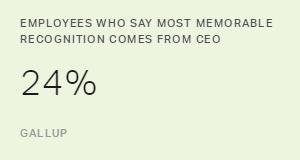Providing frequent, quality feedback is essential to building a strong organizational culture where employees continuously learn, grow and improve their performance. It is a key element of the manager-employee relationship and one of the strongest drivers of employee engagement. But, many dread feedback conversations.
New research from Gallup and Workhuman shows that employees’ preferences for frequency of feedback can differ from what analysis shows to be optimal for employee engagement. These findings emphasize the need for leaders and managers to deliver feedback that provides their employees value and highlights the vital role strategic recognition plays in elevating how employees receive feedback.
Feedback’s Reputation Problem
Gallup consistently finds that employees are significantly more likely to be engaged when they receive feedback from their manager a few times a week or more.
However, recent data from Gallup and Workhuman find that only 27% of employees say they would like to receive feedback from their manager at least weekly.
Why do employees desire less frequent feedback when the data show that those who receive feedback the most often are also the most likely to be engaged?
For many, it’s not because they are opposed to receiving input that will help them to do their best work more often. It’s because the feedback they receive is not valuable.
Some employees may only get feedback in structured quarterly or annual meetings with a manager who is just going through the motions. Others could experience feedback as unpleasant conversations with someone who is critical of their work and unclear about expectations or opportunities for improvement.
Just one in four employees strongly agree they receive valuable feedback from the people they work with. Most leaders and managers need to improve how feedback is given and perceived throughout their organizations.
They also have a great opportunity: Gallup and Workhuman find that employees who strongly agree they receive valuable feedback from the people they work with are five times as likely to be engaged, 57% less likely to be burned out, and 48% less likely to be looking or watching for another job.
Managers Must Add Value With Feedback
High-quality feedback provides value to employees by giving information and direction that will help them learn, grow and do their jobs better. Gallup research consistently finds that feedback is most meaningful when it is timely, authentic and part of frequent check-ins.
Valuable feedback includes coaching an employee through a mistake or sharing opportunities for growth. When delivered clearly and with a purpose, these conversations can feel positive and inspire employees to do their best work. However, effective leaders and managers should not provide feedback only when they must be critical.
The best feedback includes recognition and appreciation for who employees are and what they do. When feedback highlights employees’ strengths and what they do best, they receive it more positively and apply it more productively.
Recognition: A Key Part of Feedback
Recognition is a form of feedback. Through positive reinforcement, it communicates to employees which behaviors their leaders, managers and coworkers value and want to see more of.
Strategic recognition reshapes how employees experience and assess the value of feedback in their organization. It highlights what employees do best and clarifies what they can do to achieve future success.
Recognition also opens the door for frequent check-ins, making feedback timelier and actionable. It normalizes feedback more broadly as a practice within an organization, helping managers deliver critical feedback sooner. Employees respond better and act on constructive feedback more often when it is balanced with recognition.
Gallup and Workhuman’s research confirms that frequent recognition amplifies the impact of frequent feedback. Among employees who report receiving feedback and recognition from their manager at least once a week, 61% are engaged. These employees are significantly more likely to be engaged than employees who receive feedback from their manager at least once a week but receive recognition less often (38%).
Independent of how frequently they report receiving feedback, employees who receive recognition from their manager at least once a week are 2.9 times as likely to strongly agree that they receive valuable feedback from the people they work with.
Promote Frequent Feedback & Recognition to Boost Engagement & Productivity
The data show that most managers do not provide feedback often enough for it to be truly valuable, and they offer recognition even less frequently. As a result, their teams and organizations miss the significant benefits of a more engaged workforce that thrives on meaningful feedback to learn and grow.
Managers can enhance the perceived and actual value of feedback within their organizations by creating a habit of initiating meaningful conversations with employees that include recognition and other feedback. These conversations can be weekly check-ins or quick connections that happen casually and candidly.
By doing so, managers foster a culture where feedback is more valuable and positively received and drives growth and productivity. This holistic approach helps employees feel supported and gives clear direction for performance, leading to higher levels of engagement and organizational success.
Does your culture encourage recognition-rich feedback?
- Explore Gallup and Workhuman's research into the effects of recognition in the workplace.
- Learn how employees worldwide feel about their workplace culture and how it affects their outcomes at work.
- Interested in building your culture? Discover Gallup’s framework for culture transformation.




